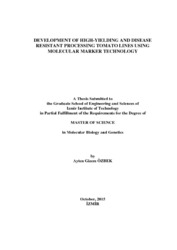Please use this identifier to cite or link to this item:
https://hdl.handle.net/11147/4544Full metadata record
| DC Field | Value | Language |
|---|---|---|
| dc.contributor.advisor | Doğanlar, Sami | en_US |
| dc.contributor.author | Özbek, Ayten Gizem | - |
| dc.date.accessioned | 2016-04-25T08:36:41Z | |
| dc.date.available | 2016-04-25T08:36:41Z | |
| dc.date.issued | 2015-10 | |
| dc.identifier.citation | Özbek, A. G. (2015). Development of high-yielding and disease resistant processing tomato lines using molecular marker technology. Unpublished master's thesis, İzmir Institute of Technology, İzmir, Turkey | en_US |
| dc.identifier.uri | http://hdl.handle.net/11147/4544 | |
| dc.description | Thesis (Master)--Izmir Institute of Technology, Molekuler Biology and Genetics, Izmir, 2015 | en_US |
| dc.description | Includes bibliographical references (leaves: 49-54) | en_US |
| dc.description | Text in English; Abstract: Turkish and English | en_US |
| dc.description | ix, 54 leaves | en_US |
| dc.description.abstract | Fresh market and processing tomatoes are an important part of the daily diet. Processing tomatoes are used for tomato paste, ketchup, soup and drying. Processing tomatoes are grown under field and/or greenhouse conditions where abiotic (cold, drought, salt) and biotic (bacteria, fungi, viruses and nematodes) stress factors can affect yield and quality. Breeding programs aim to provide disease resistant lines with high quality fruits to farmers and the processing industry. Classical breeding and markerassisted selection (MAS) are two important ways for development of novel inbred lines and tomato cultivars. Classical breeding is long term and based on phenotypic results while MAS provides genotypic information more easily and quickly. In this project, tomato lines were assessed for improved quality of various economic and agronomic features: fruit weight, external color, firmness, flowering, stem scar, fruit shape, wall thickness, yield, brix, internal color, number of flowers and number of fruits. F2 and F3 populations derived from high yielding tomato F1 hybrid MS1453 were scored for these phenotypic features. CAPs and SSR markers were used to genotype the plants and to determine QTL regions controlling the phenotypic features in the F2 population. In addition, disease resistance for Fusarium Crown and Root Rot, Tomato Mosaic Virus, Root Knot Nematode, Verticillium Wilt, and Tomato Yellow Leaf Curl Virus diseases were determined for 261 individuals to identify new sources of candidate disease resistance. | en_US |
| dc.description.abstract | Sofralık ve sanayilik domatesler günlük diyetin önemli birer parçasıdır. Sanayilik domatesler salçalık, ketçaplık, çorbalık ve kurutmalık olarak kullanılmaktadır. Sanayilik domatesler tarla ve sera koĢullarında yetiĢtirildikleri için abiyotik (soğuk, kuraklık, tuz) ve biyotik (bakteri, mantar, virüs ve nematod) stres faktörleri verim ve kaliteyi etkileyebilmektedir. Islah programları, çiftçiler ve sanayi kullanımı için hastalıklara dirençli yüksek kalitede meyveli hatlar geliĢtirmeyi amaçlamaktadır. Klasik ıslah ve markör destekli seleksiyon, yeni inbred hatların ve hibrit çeĢitlerinin geliĢtirilmesinde iki önemli yoldur. Klasik ıslah uzun süreli ve fenotipik sonuçlara dayalı iken, moleküler destekli seleksiyon genotipik bilgiye dayalı olduğu için daha kolay ve hızlıdır. Bu çalıĢmada, çeĢitli ekonomik ve agronomik (meyve ağırlığı, dıĢ renk, sertlik, çiçeklenme, kabuk yarası, meyve Ģekli, duvar kalınlığı, verim, briks, iç renk, çiçek sayısı ve meyve sayısı) özellikleri arttırılmıĢ domates hatları geliĢtirilmiĢtir. F2 ve F3 popülasyonları, yüksek verimli MS1453 F1 hibridinden geliĢtirilmiĢtir ve fenotipik özellikleri skorlanmıĢtır. CAPS ve SSR markörleri, bitkilerin genotiplerinin belirlenmesinde ve fenotipik özellikleri kontrol eden QTL bölgelerinin belirlenmesinde, F2 popülasyonunda kullanılmıĢtır. Ayrıca; Fusarium Kök ve Kök Boğazı Çürüklüğü, Domates Mozaik Virüsü, Kök-Ur Nematodları, Verticillium Solgunluğu ve Sarı Yaprak Kıvırcıklığı Virüsü hastalıkları, hastalığa dirençli yeni kaynakların belirlenmesi için 261 bireyde test edilmiĢtir. | en_US |
| dc.language.iso | en | en_US |
| dc.publisher | Izmir Institute of Technology | en_US |
| dc.rights | info:eu-repo/semantics/openAccess | en_US |
| dc.subject | Processing tomato | en_US |
| dc.subject | Quantitative trait loci | en_US |
| dc.subject | Marker-assisted selection | en_US |
| dc.subject | Agronomic traits | en_US |
| dc.subject | Disease resistance | en_US |
| dc.title | Development of high-yielding and disease resistant processing tomato lines using molecular marker technology | en_US |
| dc.title.alternative | Moleküler markör teknolojileri uygulayarak yüksek verimli ve hastalıklara dayanıklı ve teknolojik özellikleri iyileştirilmiş sanayilik domates çeşitlerinin geliştirilmesi | en_US |
| dc.type | Master Thesis | en_US |
| dc.institutionauthor | Özbek, Ayten Gizem | - |
| dc.department | Thesis (Master)--İzmir Institute of Technology, Molecular Biology and Genetics | en_US |
| dc.relation.publicationcategory | Tez | en_US |
| item.languageiso639-1 | en | - |
| item.fulltext | With Fulltext | - |
| item.openairecristype | http://purl.org/coar/resource_type/c_18cf | - |
| item.openairetype | Master Thesis | - |
| item.grantfulltext | open | - |
| item.cerifentitytype | Publications | - |
| Appears in Collections: | Master Degree / Yüksek Lisans Tezleri | |
Files in This Item:
| File | Description | Size | Format | |
|---|---|---|---|---|
| T001407.pdf | MasterThesis | 1.38 MB | Adobe PDF |  View/Open |
CORE Recommender
Page view(s)
112
checked on Jul 22, 2024
Download(s)
108
checked on Jul 22, 2024
Google ScholarTM
Check
Items in GCRIS Repository are protected by copyright, with all rights reserved, unless otherwise indicated.